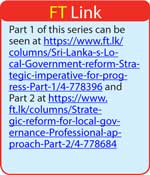Tuesday Feb 17, 2026
Tuesday Feb 17, 2026
Thursday, 10 July 2025 00:20 - - {{hitsCtrl.values.hits}}

Asset management is not a luxury; it is a foundational discipline that lies at the intersection of governance, economics, engineering, and public service
 The importance of asset management in public sector reform
The importance of asset management in public sector reform
Public sector organisations, ranging from national agencies to local councils, are responsible for managing critical assets, including roads, buildings, parks, and water systems. These are not static inventories; they are long-term investments that support community wellbeing, service delivery, and economic performance. Effective asset management ensures that these assets are used efficiently and sustainably, serving both present and future generations.
However, in Sri Lanka, asset management remains undervalued, underdeveloped, and underutilised. For public sector reform to succeed, Sri Lanka must invest in modern asset management practices that incorporate strategic planning, lifecycle cost analysis, risk mitigation, and data-driven decision-making.
Reforming provincial governance in Sri Lanka
Sri Lanka’s three-tier governance model, Central, Provincial, and Local, deserves reconsideration. The necessity of Provincial Councils is increasingly questionable. For context, New South Wales, Australia, which is 12 times larger than Sri Lanka, functions without provincial structures. This comparison highlights that administrative layers should be based on practicality rather than size or complexity.
The creation of Provincial Councils was a political response to regional and ethnic tensions, but today, many view these councils as redundant. There is no question that ethnic needs are to be fulfilled. In my view, strengthening local government bodies, Municipal Councils, Urban Councils, and Pradeshiya Sabhas would be a more effective solution. Local governments, being the closest to the public, are better positioned to address community needs and deliver essential services.
A call to action: Strengthening asset management for Sri Lanka’s future
Sri Lanka stands at a pivotal moment. To restore confidence in Government institutions and improve service delivery, the country must invest in professional, strategic asset management. This requires formal recognition of Asset Management Engineering as a specialised discipline, development of academic and professional pathways to build a skilled workforce, creation of cross-disciplinary teams combining expertise in engineering, finance, ICT, and governance, and a cultural shift that prioritises long-term planning and responsible stewardship of public assets.
Asset management is not a luxury; it is a foundational discipline that lies at the intersection of governance, economics, engineering, and public service. To secure Sri Lanka’s future, it must be recognised and treated as such.
 Local governments play a critical role in managing essential public infrastructure such as roads, bridges, parks, community buildings, and sanitation services. They are also tasked with safeguarding public health, regulating land use, and maintaining local amenities that impact the daily lives of millions. However, in Sri Lanka, the capacity of local governments to effectively carry out these functions is constrained by limited resources and outdated management systems. Most funding comes from council rates, which are insufficient to meet the growing expectations of urban and rural communities alike.
Local governments play a critical role in managing essential public infrastructure such as roads, bridges, parks, community buildings, and sanitation services. They are also tasked with safeguarding public health, regulating land use, and maintaining local amenities that impact the daily lives of millions. However, in Sri Lanka, the capacity of local governments to effectively carry out these functions is constrained by limited resources and outdated management systems. Most funding comes from council rates, which are insufficient to meet the growing expectations of urban and rural communities alike.
In contrast, local governments in countries like Australia benefit from substantial financial support from federal and state governments. They are also empowered to invest earnings responsibly in commercial markets, under a tightly regulated framework. Introducing similar investment strategies in Sri Lanka would be risky without robust regulatory mechanisms, given existing challenges in governance and accountability, such as corruption and wastage.
As a result, many Sri Lankan local authorities are limited to providing basic, reactive services, neglecting long-term infrastructure planning in favour of short-term crisis management. One of the most significant casualties of this approach is asset management, a discipline crucial to the sustainability of public infrastructure but often under-prioritised.
Learning from Australia: The NSW Integrated Planning and Reporting Framework
In New South Wales (NSW), Australia, local councils are legally required to adopt the Integrated Planning and Reporting Framework (IPRF), which aligns local operations with both state-level priorities and the needs of their communities. This begins with structured community consultation, leading to the creation of a 10-year Community Strategic Plan (CSP). The CSP, which is reviewed and updated annually, sets out the long-term vision for each area.
Each council’s actions are directly linked to specific objectives outlined in the CSP. If an initiative does not align with these goals, it does not receive funding. Significant divergences from community aspirations require re-endorsement through further consultation, ensuring strategic integrity and accountability throughout the planning cycle.
Alignment with national and state priorities
For a governance system to function efficiently, all tiers of government must align their strategies. In Australia, local government plans must complement national and state-level initiatives in areas such as transport, energy, and economic development. This alignment ensures that resources are used effectively and that development efforts are complementary across all levels of government.
The integration of top-down and bottom-up strategies enhances efficiency, transparency, and coordinated development, providing a model that Sri Lanka could adapt to improve governance across local jurisdictions.
Asset management: A cornerstone of strategic local governance
In NSW, asset management is integral to local governance. Councils are required to develop detailed Asset Management Plans (AMPs) for major infrastructure, including long-term financial projections for both development and maintenance. These plans are part of the broader Resourcing Strategy, which also includes a Long-Term Financial Plan to ensure ongoing financial sustainability and a Workforce Management Strategy to align human resources with strategic goals.
Councils consult with the community to define service levels and engage in public dialogue if available funding cannot meet service expectations. This transparent, consultative approach ensures that both asset development and maintenance are financially and socially sustainable.
Lessons for Sri Lanka
Sri Lanka’s local governments must transition from a reactive, short-term focus to a proactive, service-oriented model. By adopting frameworks like the NSW IPRF, Sri Lanka could enhance community consultation and public engagement, align local council activities with national and provincial goals and improve financial sustainability and accountability.
These reforms can be implemented without constitutional changes, through administrative directives, circulars, and professional training. A strategic, long-term approach is needed to transform Sri Lanka’s local governance, ensuring it becomes a driver of sustainable development and public service innovation.
Building the foundations for sustainable governance
 One of the strongest aspects of the NSW model is its commitment to transparency. Councils are required to make their service delivery, operational, and financial plans available for public review before approval. This process ensures that communities play an active role in shaping priorities, budgeting, and holding local authorities accountable.
One of the strongest aspects of the NSW model is its commitment to transparency. Councils are required to make their service delivery, operational, and financial plans available for public review before approval. This process ensures that communities play an active role in shaping priorities, budgeting, and holding local authorities accountable.
While Sri Lanka’s local government procedures involve community consultation, these are often informal or poorly documented. A more structured, transparent approach to planning would mark a significant shift toward accountable, citizen-centred governance.
A gradual approach to reform: Lessons from practice
Reforming asset management in Sri Lanka’s local government sector will require time. Challenges such as shortages of qualified professionals, outdated systems, and limited budgets mean that full-scale reform must be phased. Drawing from personal experience in developing Asset Management Plans in Australia, it is clear that asset management is an ongoing process, not a one-off project. Sri Lanka must begin this journey now, focusing on structured, scalable practices that can evolve over time.
Strategic staffing: Strengthening local capacity
To enhance local governance, in addition to the typical administrative roles currently available in local government, it is crucial to create specialist roles in lower-tier local authorities, such as an Information Administrator, a Data Analyst, an Asset Management Engineer, an Environmental Management Officer and a Community Engagement Officer. When filled by individuals with the appropriate qualifications and training, it will bring technical expertise and improve governance practices.
Cross-government collaboration: The “Adopt an LG Kid” model
To facilitate shared learning and resource optimisation, a collaborative initiative could be implemented, where larger councils “adopt” smaller ones. This model would foster mutual support and ensure that all local authorities benefit from shared expertise, capacity-building, and strategic frameworks.
Leveraging national expertise: A role for the CECB
Sri Lanka’s Central Engineering Consultancy Bureau (CECB) could play a pivotal role in bridging the technical gap in local governments. By seconding skilled personnel to local authorities, the CECB could provide hands-on support in developing asset management systems and mentoring junior staff, ensuring that local councils are equipped to manage community assets sustainably.
Actionable frameworks: Developing local guidelines
National guidelines should be developed for all local authorities in Sri Lanka. These would cover community consultation protocols, integrated planning methodologies, asset management lifecycle principles and performance reporting standards.
Such guidelines would provide a platform for accessing international technical and financial assistance, facilitating systemic change within local governance structures.
A path toward greater efficiency
The transformation of Sri Lanka’s local governments does not require a complete overhaul, but rather a disciplined, phased approach. By focusing on capacity-building, inter-council collaboration, technical guidance, public participation and professionalisation of asset management.
Sri Lanka can make meaningful progress toward more efficient, transparent, and responsive local governance.
The long journey begins with the first step
Asset management is not merely an engineering task. It is a strategic necessity. It is about preserving public assets, planning for future generations, and ensuring sustainable, reliable services for communities. For Sri Lanka, the path forward is clear: begin modestly, but begin now. Establish a national vision, build the frameworks, train the people, and engage the public to create a more resilient, accountable system of local government.
Concluded
(The writer is a Chartered Professional Engineer, a Fellow, and an International Professional Engineer of both the Institution of Engineers, Sri Lanka, and Australia. He holds two Masters Degrees in Local Government Engineering and in Engineering Management and at present, works for the Australian NSW Local Government Sector. He shares over three decades local and overseas experience with Sri Lankan professionals to transform public sector management practices to meet international standards. He is contactable via [email protected].)